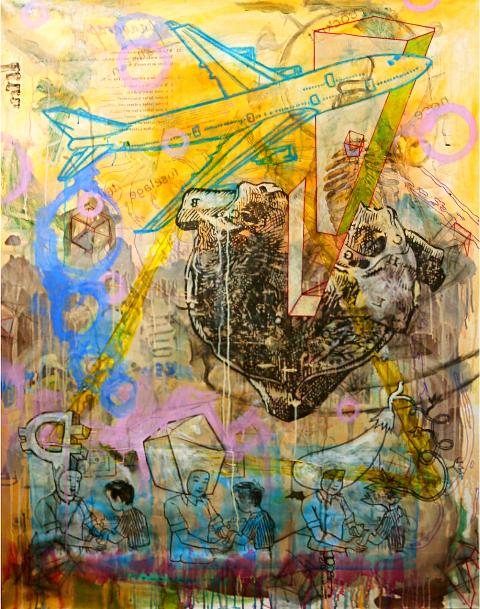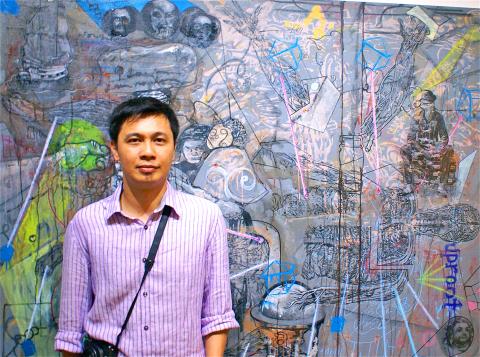Philippine artist Don Salubayba has baggage. So do I. So do you. So does everyone.
Painful childhood memories, professional stress, fear for the future, addiction. Baggage is perhaps an ideal — though a bit simplistic — metaphor to ponder these self-absorbed times.
But for Salubayba, baggage isn’t just a burden weighing down the individual. With his exhibition Bagahe — Excess Baggage, he lays bare some of the prevailing shackles that he feels subjugate his country’s people. The six collage-like paintings, two sculptural installations and a video, currently on view at Project Fulfill Art Space (就在藝術空間) in Taipei, also have resonance here in Taiwan.

Photo: Courtesy of Project Fulfill Art Space
“Whereas other countries export products, [The Philippines] exports people,” he said.
It’s a particularly significant comment in light of the arrest two weeks ago of Jacqueline Liu (劉姍姍), a US-based diplomat for Taiwan who has been charged with underpaying and overworking her Filipino employees.
I didn’t ask Salubayba about Liu’s case and the attention it could bring to similar practices in Taiwan, which, according to Council of Labor Affairs statistics, has 420,000 migrant workers.

Photo: Noah Buchan, Taipei Times
Nor did I ask him about the recent case in Hong Kong in which a Filipina domestic helper won the right to apply for permanent residency — a ruling met with much grumbling from authorities there.
Instead we discussed a project about the experiences of Filipinos living and working in Taiwan that Salubayba conducted last year as part of a residency at Taipei Artist Village.
“I interviewed 25 Filipinos. Only five of them had positive stories,” Salubayba said.
And though internationally known Chen Chieh-jen (陳界仁) has addressed the harsh conditions migrant workers often experience in Empire’s Borders I (帝國邊界I), Salubayba is largely correct when he says it is a topic Taiwanese artists rarely concern themselves with.
In any event, Salubayba’s art isn’t an emotional reaction to perceived injustice — no activism on canvas here. He said most of the burdens Filipinos encounter are rooted in their desire to escape conditions in their home country.
“I think most of us are blinded, that starting a new life [elsewhere] will solve our problems,” he said.
As Slit-slip-slice-send reveals, many of these problems are to be found in an educational system that assigns roles based on an outdated notion of gender. Like all paintings on display, he projects an old photograph onto the canvas, reverses it to avoid copyright issues, reduces it down to a basic, almost graffiti outline in black, and builds it up to form a tableau of interconnected figures, objects and text on a translucent array of primary coloring.
Embedded on the surface of the canvas are simple phrases torn from school textbooks that make reference to the roles children are expected to fulfill later in life. Three female figures at the bottom are symbolically engaged in the roles society has assigned to them: earning money, rearing children and caring for the elderly. An airplane at the center offers escape from what many see as a dreary existence.
The baggage of the Philippines’ colonial past comes under scrutiny as well. Curse of the White Package pokes fun at the Filipino obsession with beauty pageants, popularized during the US occupation of the country. The women pictured are faceless and their bodies are rendered in vague outline, symbolizing that their individually has been effaced under a general idea of beauty.
Equally prescient is Patnubay (Guidance). The installation features a shredded map of the Philippines affixed by plastic wire to an open suitcase that contains an amulet of protection. It suggests how the often repressive religious orthodoxy of the past retains symbolic importance for those migrating abroad in the present.
In Bagahe — Excess Baggage, we don’t so much as look at Salubayba’s work as read their symbolic connections and meanings. Patiently doing so might help us to forget our own troubles, at least for a time.

Behind a car repair business on a nondescript Thai street are the cherished pets of a rising TikTok animal influencer: two lions and a 200-kilogram lion-tiger hybrid called “Big George.” Lion ownership is legal in Thailand, and Tharnuwarht Plengkemratch is an enthusiastic advocate, posting updates on his feline companions to nearly three million followers. “They’re playful and affectionate, just like dogs or cats,” he said from inside their cage complex at his home in the northern city of Chiang Mai. Thailand’s captive lion population has exploded in recent years, with nearly 500 registered in zoos, breeding farms, petting cafes and homes. Experts warn the

No one saw it coming. Everyone — including the Chinese Nationalist Party (KMT) — expected at least some of the recall campaigns against 24 of its lawmakers and Hsinchu Mayor Ann Kao (高虹安) to succeed. Underground gamblers reportedly expected between five and eight lawmakers to lose their jobs. All of this analysis made sense, but contained a fatal flaw. The record of the recall campaigns, the collapse of the KMT-led recalls, and polling data all pointed to enthusiastic high turnout in support of the recall campaigns, and that those against the recalls were unenthusiastic and far less likely to vote. That

The unexpected collapse of the recall campaigns is being viewed through many lenses, most of them skewed and self-absorbed. The international media unsurprisingly focuses on what they perceive as the message that Taiwanese voters were sending in the failure of the mass recall, especially to China, the US and to friendly Western nations. This made some sense prior to early last month. One of the main arguments used by recall campaigners for recalling Chinese Nationalist Party (KMT) lawmakers was that they were too pro-China, and by extension not to be trusted with defending the nation. Also by extension, that argument could be

The centuries-old fiery Chinese spirit baijiu (白酒), long associated with business dinners, is being reshaped to appeal to younger generations as its makers adapt to changing times. Mostly distilled from sorghum, the clear but pungent liquor contains as much as 60 percent alcohol. It’s the usual choice for toasts of gan bei (乾杯), the Chinese expression for bottoms up, and raucous drinking games. “If you like to drink spirits and you’ve never had baijiu, it’s kind of like eating noodles but you’ve never had spaghetti,” said Jim Boyce, a Canadian writer and wine expert who founded World Baijiu Day a decade